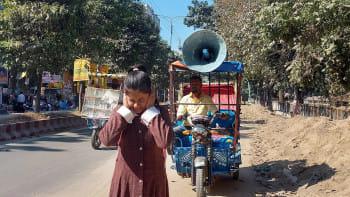Can AI solve the insanity of Dhaka’s traffic?

I might be wrong but when we talk about artificial intelligence (AI), isn't it assumed that some plain, regular "intelligence" must preclude it? In other words, it is expected that before jumping into the rather new and unexplored realm of artificial intelligence, we should have at least dabbled a bit in some old-fashioned "common sense."
The announcement of the Dhaka South City Corporation (DSCC) installing an AI-driven signalling system to fix Dhaka's number-one debilitating disease – its paralysing traffic congestion – is a bit of a jolt to our pea brains. After all, how can we forget the much-hyped-about automated traffic lights in all the main streets installed 15 years ago, at a cost of Tk 119 crore, that may be described by brutal critics as resulting in "a big fat zero"?
Experts are not impressed with the latest news and are decrying that "no science will work unless roads are expanded and discipline enforced." Let's focus on the word "discipline" and see what we have of it when it comes to our streets.
Along the less than seven percent of the city area that are roads, we have about 17.8 lakh registered vehicles rushing through. These include the over three lakh private cars, one lakh vans, 84,000 plus microbuses, 78,000 trucks, 37,000 buses, 30,000 taxicabs, thousands of other vehicles such as taxicabs, covered vans, human haulers, tempos, jeeps, tractors, auto-rickshaws, nasimons and so on, which are circumvented by daredevils zigzagging on about nine lakh motorbikes. Interspersed between all this are the snail-paced rickshaw vans carrying everything from garbage to furniture, and the thousands of rickshaws driven by nonchalant pullers who actually try to race against private cars and will take sharp turns on the busiest roads.
But let's not forget the hordes of self-righteous jaywalkers who will perform praiseworthy acrobatics to climb over or squeeze through road dividers, consciously risking dismemberment and death, rather than walk to the footbridge just a few feet away. They will also think nothing of calmly crossing a busy thoroughfare with just the power of The Hand. The expectation is that no matter what speed the motorised vehicle is running at, it must come to a screeching halt as soon as that magical raised hand is seen.
Given these realities, it is not surprising that the streets resemble a battlefield where the victorious is whoever can elbow the others out to come out first. This is no football game where foul moves will entail red cards or penalties – the referees, in this case, the traffic cops, are either absent, or busy halting commoners for VIP movement. No, this is full-on war where one must go to one's destination and be ahead of others, at all costs.

In the hierarchy of vehicles, buses have all the power. They may be rickety – with broken windshields and backlights, and battered, with most of their coating scraped off, and emitting the blackest of smoke – but they rule the roads completely and always have "right of way." They can stop in the middle of the road to pick up passengers, ram into smaller vehicles, nudge other buses while in a high speed race against them – in the middle of the road, perhaps flattening the human bodies that dare to come in their way – and zoom away without inviting even a cursory glance from the traffic police who has been made indifferent with some magic "tea money." Trucks, too, enjoy this power, but only after dark do they live up to their "killers on the road" title.
The next in rank are the monstrously large SUVs that usually belong to a VIP or a "VRP" (very rich person), and both titles come with similar levels of entitlement. These vehicles will just keep edging away the little vehicle, be it a sedan or an auto-rickshaw, using their special sirens (sometimes wireless speakers) to intimidate and shoo away the minions.
But private sedans, some of them swanky sports cars, do enter the race – especially if they are driven by the offspring of a VIP or VRP. In fact these precious creatures often think of themselves as little Schumachers and will whiz by on Airport Road and the little lanes of residential areas alike, adding to the thrills and palpitations of those in the other vehicles or travelling on foot.
Obviously logic and common sense do not have any role to play in Dhaka's mad and maddening traffic, which is why the much celebrated automated traffic signals did precious little and the traffic police went back to the age-old way of controlling traffic – with their hand movements and a rusty whistle.
Against this backdrop, how will AI signalling work? Will AI be able to fix the complete lack of regard for traffic rules and basic decency of drivers and jaywalkers when they are on the streets? Will this "intelligence" be able to stop the wheeling and dealing that make it possible for dilapidated vehicles and stuntmen disguised as drivers to go about their business of making Dhaka the seventh worst city in traffic management? Will AI be able to make sure motorised and non-motorised vehicles do not ply the same roads? Will it help to expand the road area to the 25 percent level needed to detangle the continuous gridlock? And will it clear the footpaths, stop the double and triple parking on busy streets? Most importantly, will artificial intelligence be able to prevent the 40 plus new private cars entering Dhaka's streets every day?
Perhaps we need to introduce some good old "natural intelligence" to our traffic management, before elevating it with the artificial kind.
Aasha Mehreen Amin is joint editor at The Daily Star.

 For all latest news, follow The Daily Star's Google News channel.
For all latest news, follow The Daily Star's Google News channel. 






Comments